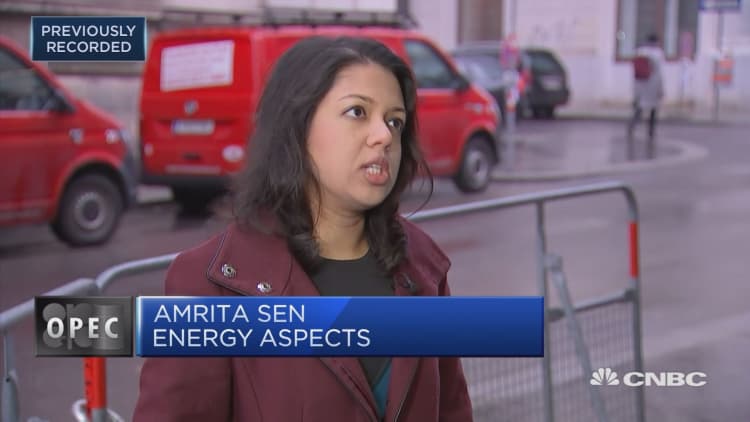
As OPEC and non-OPEC oil producing countries meet in Vienna there are concerns that Russia could up-end plans to extend a deal to increase output cuts due to domestic pressures.
The current deal, between OPEC and non-OPEC producers including Russia, is set to expire in March, although it is widely expected to be extended until the end of 2018 — not least of all because Russian President Vladimir Putin suggested this himself in October.
Since then, however, there have been rumors of jitters in Russia's domestic oil industry and pressure being exerted on Putin not to allow the extension to go on for so long, making the meeting in Vienna and Russia's participation in it crucial for markets.
Analysts believe there are ways that the group could allay Moscow's concerns.
Amrita Sen, chief oil analyst at Energy Aspects, told CNBC on Wednesday that it is possible for Russia to ask for more clarity on when the deal would end and how that could be managed.
"I think they (the Russians) are also backing a nine-month extension but all they're saying is that it's less easy for them. They don't have one big oil company that they can just crank up production (when the deal ends). They probably need a bit more guidance on whether the market should tighten by such-and-such a time and how we're going to deal with it," she said.
"You've got at least three or four (oil) companies there in Russia. They need to have an annual strategy in place and also they can't do much in the fourth quarter and first quarter as it's so cold — they can't do the extra drilling. So I think that's why they prefer a six-month extension rather than a nine-month one as that takes them right into winter."
Great expectations
Despite potential concerns and requirements from Moscow, Sen believed that there would be a nine-month extension to the deadline in March 2018 "and to deliver anything less than that is going to be a disappointment to markets."
"OPEC knows what the stakes are, — they came out three weeks ahead of the meeting and announced a nine-month extension (to the output cut), which was a positive surprise and yet the market sold off so much on the day of the meeting because expectations were high," she said.
Jamie Webster, senior director at BCG Center for Energy Impact, didn't think there was any wildcard within the OPEC group and that a deal would be agreed, although Russia's requirements could differ.
"I think the group is going to be pretty aligned on this, it's Russia that we have to watch," he said. "I still think we're going to get a deal, I think there's going to be a lot of excitement over the next couple of days and I think what we're going to end up getting is a six or a nine-month deal, that's what it's coming down to," he said.

"Sure there's still an outside chance that things could go a little crazy, but you're probably looking at somewhere in there," he added.
Despite a possible extension, Webster believed that 2018 would still be a year in which markets were oversupplied with oil. "Next year, (the oversupply) it's going to be another big challenge. Shale oil is ready to get booming… and so you're going to end up with a big oversupply."
For their part, OPEC members are confident about finding a consensus at the meeting. Speaking to CNBC on Tuesday ahead of the OPEC summit, the United Arab Emirates (UAE) Oil Minister Suhail al-Mazroui said that there were several options regarding an extension.
"We are waiting to meet with everyone so it's not practical to give you (information) about what is going to be discussed but what we can tell you is that we'll discuss several scenarios, among them an extension for the whole of 2018. But that is not the only option we will discuss, we will talk about other options," he said.
"I am personally optimistic that this group that has worked very hard in 2017 to stabilize the market — we have seen very good results towards a market recovery. We still need to continue, but that decision is going to be discussed and no one can predict what is going to be the decision."


